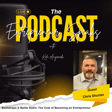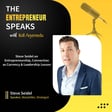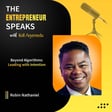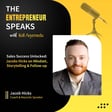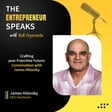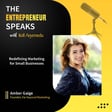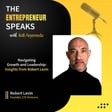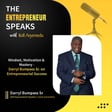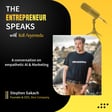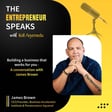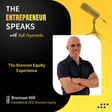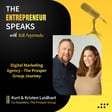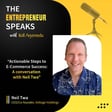Generative AI's Impact on Business
00:00:05
Speaker
Kofi, I will tell you that it's the greatest time to be alive ever. Because we are in a moment, in a crossroads, where there's a new technology called Generative Artificial Intelligence, which really has the potential to change everything about how we do and manage businesses.
00:00:25
Speaker
If you're a young entrepreneur, if you're a young talent joining the market now, you're able to become a specialist. You're able to become a high level user of this technology, and that will put you ahead of the competition.
00:00:44
Speaker
So my tip for anyone getting into the market is to really dive deep into learning and understanding more about this technology called Generative AI,
00:00:56
Speaker
adopting it as an everyday tool, just the very same way we use the mobile phone and WhatsApp and Google Chrome, we should be using AI tools every
Google Gemini's Competitive Edge
00:01:06
Speaker
day. I really like the path that Google is taking with Google Gemini. It's the product that Google has released, which is really delivering better results than every other solution in the market.
00:01:19
Speaker
So it's a very special time to become a Google Gemini specialist, for
Insights from Kenneth Correa
00:01:25
Speaker
example. Hello and welcome to another exciting episode of the Entrepreneur's Fix podcast.
00:01:30
Speaker
I'm your host Kofi Anymedo. My guest is a technology thought leader, entrepreneur and author of Cognitive Organizations published in 2024.
00:01:43
Speaker
As the founder of Data Neural, an AI consulting firm, and Head of Strategy at AT20 Marketing, he is dedicated to helping organizations harness the power of AI agent networks to achieve transformational results.
00:01:59
Speaker
With over 25 years of experience and a global presence spanning Brazil, the UK and US, s he specializes in bridging cutting-edge AI innovations with practical business applications.
00:02:13
Speaker
His clients include Fortune 500 companies and leaders in healthcare, finance, and technology. Through his consulting, workshops, and international keynotes, he equips businesses with frameworks to drive productivity and stay ahead in the AI era.
00:02:31
Speaker
My guest today is Kenneth Correa. Welcome to my show, Kenneth. Hey, Kofi, thank you very much. It's a pleasure to be here to be able to share a little bit about this AI revolution, which is happily happening at our own time. So happy to be here. All right. Happy to also have you on my show.
00:02:50
Speaker
Let's kick this off with you telling us a bit about yourself and what really sparked your journey to entrepreneurship and emerging technology. All right, Kofi.
Kenneth's Entrepreneurial Journey
00:03:00
Speaker
So, I am from the western part of Brazil, close to the border with Paraguay. So, when you look at the map of South America, I'm in the exact middle spot, north and south and east and west of South America.
00:03:15
Speaker
It's a place called the Pantanal. It's a beautiful wildlife area, as I'm pretty sure you have. In Ghana, we have this wet part of Brazil where I come out of.
00:03:25
Speaker
But from where I come from, we only talk about cattle raising and agriculture production of grains. But some 25 years ago, I began my entrepreneurial journey.
00:03:39
Speaker
I started working on some small firms, small office environments, and soon it hit me that there was probably a better way to do what these companies were doing.
00:03:52
Speaker
And I was very happy to be one of the first users of the internet in Brazil. I was part of the first 100,000 users of the internet in Brazil. And of course the internet opened a big window.
00:04:06
Speaker
And me being an English speaker since I was a kid, of course Kenneth is not a common name in Brazil, but my grandmother comes from the United States. She not only gave me the name, but also taught me the language.
00:04:19
Speaker
So I was able to read in English what was happening around the world in the mid 1990s. So my entrepreneurial journey It started in the year 2005 when I opened my first company.
00:04:33
Speaker
Okay. And what was this company? What was your first company? Can you tell us about this first company?
Active Management's Origins
00:04:38
Speaker
Yeah, sure. The name was in Portuguese, but it meant Active Management. was a tech consulting firm.
00:04:46
Speaker
Because again, the internet was in its early beginnings. Remember in 2005, we didn't even have the iPhone yet. E-commerce was having its first steps when people were understanding that Amazon.com being commemorating 10 years at that time.
00:05:04
Speaker
And then new e-commerce stores gain traction in the United States, the very same thing was happening in Brazil with a little bit of a gap, a delay.
00:05:16
Speaker
So everything happened in the United States took at least five years to begin in Brazil. But whenever the internet came about, I saw that it was easy to bridge that gap.
00:05:29
Speaker
It was easy for me as a tech enthusiast, as somebody who is an early adopter of technology, I had an easy time using the mobile phones or is smartphones and also using the computer, developing and writing code.
00:05:44
Speaker
We didn't have AI yet, but I was already developing code. I was introducing companies to their first digital experience, being that an e-commerce or a website after the mobile revolution, a mobile app. All of that were some of the initiatives that I was charging companies to deliver. So active management was the idea that people should manage their companies in a more proactive way aiming to deliver results by the use and support of technology.
00:06:15
Speaker
so Okay. All right. So let's still build on your submission. So from that particular point, what's next? What what did you move to? from that All right. Yeah.
Expansion Across Latin America
00:06:24
Speaker
Sure. Of course. So Kofi, starting the company in 2005, that's 20 years ago, we started attending and servicing all sorts of different clients, but those were all local companies.
00:06:37
Speaker
So imagine I'm talking about this small brewery that was brewing beer. I'm talking about this little church in the neighborhood or helping this small school.
00:06:49
Speaker
After some years passed, we started working with some larger companies. So now not only neighborhood-wide, but city-wide and then statewide. And that's when digital marketing started being a thing.
00:07:04
Speaker
I'm talking about around 2007 and so four years into the company. And then there was this company called 8020 Marketing, which was in its early days. And I became friends with the founders of these companies because we worked together.
00:07:23
Speaker
Every time I had a customer who needed digital marketing, special especially social media marketing, I would bring this guy's business in and they would pay me a commission.
00:07:34
Speaker
And whenever they needed something that needed computer code, e-commerce development, website or our mobile apps, they would bring me in and they would pay me a commission. After some months, we realized that we were responsible for 50% of each other's business.
00:07:52
Speaker
And then we said, maybe it's time we skip the dating period and then we get married. That was the metaphor for we used at the time. So we fund funded, but we made a fusion of both companies in the year of 2013. That's 12 years ago.
00:08:13
Speaker
So after that, we did this very same thing 11 times. With 10 different companies, we started merging and acquiring, and then we became ah a little bit of a powerhouse in our Pantanal region.
00:08:29
Speaker
And we started working with larger clients, now not only citywide or provincewide, but now countrywide. and then continent-wide, we're working with all Latin in America.
00:08:42
Speaker
So now we have a team of 95 people in 8020 Marketing. We service some of the largest companies in the world that operate in Latin America.
00:08:54
Speaker
So all the way from Rio Grande, which is the border of the United States and Mexico. So that's our northern limit. Down to the south of Argentina in a place called Perito Moreno.
00:09:08
Speaker
All of these businesses operating this region are now clients of ours. So that's what we do. We help them with their marketing and product and communications and strategy for their businesses. Using our team, which is compounded of just 90 more people with different specialties. I'm talking about marketing and technology specialty as main areas. And that's what we have been doing now for 16 years with Betty Marketing.
00:09:35
Speaker
All right. So thank you for that. I also read in my research that you are a lecturer at the biggest Brazilian business school. Tell me about that part of your life and what do you do there.
Networking through Teaching
00:09:48
Speaker
Of course, Kofi. So being a service provider is always good to have a founder-led marketing. That means that the founder, the people in charge, the executives are doing all the hard work of marketing our company, making our brand content.
00:10:05
Speaker
And being a professor really kicked in as a great strategy, not only because I love the classroom, I love being a class full of students and exchanging knowledge, but also because some of the students in a business school are, of course, working in business, are sometimes business owners themselves.
00:10:24
Speaker
So it's a way for me to be teaching them about whatever we do marketing and technology wise, and they will link and connect that with what my company does.
00:10:35
Speaker
So it's very common for me to leave a classroom and the next week, get two or three different emails of people asking for meetings and for business proposals.
00:10:47
Speaker
So it really worked out as a good networking opportunity with executives. But I started teaching back in 2005, so back 20 years ago.
00:10:59
Speaker
So I've always loved management. business administration, understanding the inner twinings and logics of running a business. And I have been working with education of different technology waves.
00:11:14
Speaker
So 20 years ago was the internet and e-commerce. Some 15 years ago was social media. Some 10 years ago was big data.
00:11:25
Speaker
Eight years ago was blockchain. Some three years ago, ai came along. So every different wave of new technologies or what I call emerging technologies are all the topics that I would take and bring to the to the classroom.
00:11:43
Speaker
All right. So based on your submission, i would like us to break down a couple of things you've mentioned in your submission.
Understanding Big Data
00:11:49
Speaker
So you've mentioned big data. You've mentioned blockchain.
00:11:53
Speaker
You've mentioned AI. And reading about you, I realize that you do a lot about the metaverse and also do a lot when it comes to AI agents. So let's start breaking these concepts down for us to all appreciate.
00:12:08
Speaker
So let's start with big data. When we talk about big data, what are we referring to? Of course. So the logic of analyzing data is not something new. As business owners, we always have to look to our financial statements.
00:12:21
Speaker
We have to look to at our productivity indicators, the KPIs of the business. And that's usually done using some piece of yeah ERP software, that's management software. You can use Microsoft Excel as a spreadsheet, for example.
00:12:35
Speaker
But after we started using the mobile phone, After our lives are now eight, nine hours a day connected to this piece of technology, the amount of data that we generate every time we unlock the screen, every time we open up an app, every time we connect on a website, or look at a social media feed, every small action that we do in smartphone generates a piece of data.
00:13:02
Speaker
And analyzing this data can give you amazing insight in how the customer behaves, how the customer reacts to the content you're creating, which products or services will have a greater impact on customers. All of that is something that you can use out of analyzing this data.
00:13:22
Speaker
But the thing is, it's too much data. You cannot put it on Microsoft Excel. It's not enough. You cannot use a single computer to process this data. You need a network of servers. You need sometimes a GPU, the graphics cards, to process this data. So big data is the process of extracting value out of bigger and bigger databases. They are not only big, but they are growing and growing all the time.
00:13:47
Speaker
Okay, so how about blockchain? When you talk about blockchain technology, what what are you referring to?
Blockchain's Role in Cryptocurrency
00:13:52
Speaker
Sure. Blockchain is the technology behind the Bitcoin. Bitcoin being the most pervasive use of this piece of technology. But it's not limited to digital currency. Actually, blockchain technology It's called a distributed ledger technology, which means you have distributed servers with the same data recorded.
00:14:18
Speaker
And now when you use blockchain, you cannot delete, for example, a hacker cannot get into a server and delete a piece of data from that server. Because if he can do that, you have other copies of that same information in other servers.
00:14:34
Speaker
So it's a technology based on trust. Trust that every piece of data in that database is immutable, is unchangeable.
00:14:45
Speaker
So blockchain technology is very useful in scenarios where you need to be absolutely certain that data is not being changed. So for example, when working with logistics companies, you are part of a supply chain, a chain of different suppliers that move goods are around.
00:15:04
Speaker
Now, some consumers in Europe, for example, if they want to buy an export from Ghana, they want to really be sure where that export was taken out of. For example, if it's mining and they are working with ore mining, they have to be absolutely certain that that ore came out of that specific mine at that date and time.
00:15:29
Speaker
And they did not want this data to be changed at all. So what they do is they register the extraction in a blockchain. So everybody in the next steps, now the trucking company, then the airplane, and then the train, and the retailer on the other side of France, for example, is able to check where specifically that technology was taken out.
00:15:52
Speaker
So it's the idea of distributing information for having more trust in whatever is in that area. So let's talk about the very popular one, the one we we hear almost every day, artificial intelligence, AI.
Understanding AI Capabilities
00:16:07
Speaker
What is that? Okay, AI. AI is not exactly a new technology. The first time AI was mentioned was 79 years ago. That was a little bit after the Second World War happened.
00:16:23
Speaker
And the Second World war War used a lot of military engineers. People who were scientists and engineers started taking part of the military to work on logistics and to develop code, for example, to keep information safe.
00:16:40
Speaker
Now, at that time, people started considering the idea that the computer would become more powerful. And I think you can agree that computers are a lot more powerful in 2025 than they were in 1945, right?
00:16:56
Speaker
Some 80 years ago. So what happened with the technology is it became more and more powerful. So now we can say that the computer is able to simulate, to emulate, to copy,
00:17:12
Speaker
the behavior of a human being. So we call it artificial intelligence because it's the computer trying to mimic Human intelligence. That means creating new text.
00:17:26
Speaker
That can mean creating some videos. I don't know if you have been seeing the new release by Google with VO3 technology. So it's copying video. You have artificial intelligence that can synthesize a voice so you can clone the voice of other people. That's also considered AI. And you can also make something that humans are very good called a projection.
00:17:50
Speaker
When you project information into the future, you can make predictions. You can predict the price of goods. You can predict the volume of production.
00:18:00
Speaker
You can predict the weather, like a weather forecast. So all of this is helped by the use of artificial intelligence, this technology that mimics what humans do, but in a faster and more powerful way than human beings.
00:18:16
Speaker
Okay, so my guest once again is Kenneth Correa and he's taking us through his entrepreneurial journey. Now he's broken down a number of everyday or household concepts we we we really come across.
00:18:29
Speaker
Kenneth, let's still build on this. We also hear of another popular one, the metaverse.
Exploring the Metaverse
00:18:34
Speaker
What is that about? Yes. So the metaverse became very popular in October 2021.
00:18:42
Speaker
Remember at this time, the world was going through a COVID pandemic. A lot of people in the Western world were locked up in their homes.
00:18:53
Speaker
Vaccinations were just beginning at that time. So it's a time when the use of technology became very popular, even with people that did not like technology at all.
00:19:05
Speaker
So I know in Ghana, WhatsApp is very popular. So a lot of people began using WhatsApp during the COVID-19. In the United States, the delivery of food was not very popular. After that, it became huge.
00:19:20
Speaker
So a company which used to be called Facebook, changed their name to Meta because they said that they were going to focus all their investments, more than 15 billion dollars and more than 10 years of investment, in creating the metaverse.
00:19:40
Speaker
But now Kofi and Kenneth are like one looking at each other and say, okay but what is the metaverse? Everybody wanted to know what is Mark Zuckerberg going to invest $15 billion, dollars even changing the name of his company.
00:19:56
Speaker
So the idea of the metaverse is an immersive social environment where people communicate and execute all sorts of experiences.
00:20:09
Speaker
The metaverse is used for gaming. For example, on Fortnite or Roblox, you have different players with different characters, or may I say avatars, which is the name they use in the metaverse.
00:20:23
Speaker
ah but People are very immersed into this game. So for example, my son who plays Roblox really feels like he is the one in that virtual world.
00:20:34
Speaker
And also, it's a social place, so he connects with other friends. He meets new people and executes different tasks. But it's not only for gaming. You can do that for tourism, where you can visit virtual copies of other places.
00:20:50
Speaker
Of course, people ask me, but it isn't it better to travel in person? And I say, of course it is, but it's expensive. Not always will have the budget to go everywhere that we wanted. So if we can make a virtual tour from our home, for example, if I wanted to visit now the Iran or Gaza, I don't think those are safe regions for you to travel in person.
00:21:14
Speaker
But you can enjoy the experience of visiting these places by using virtual reality. So this is part of the metaverse. You can use it for training. I have a client, for example, which is a big factory.
00:21:26
Speaker
that processes pulp, pulp from the trees, to create paper. Now these guys had to train hundreds of people every month that were new factory workers. And working in a factory as big as this one has a lot of safety hazards.
00:21:44
Speaker
There are parts of that factory that you shouldn't walk into. There is machinery in that factory that you really have to know how to use or as you can lose your fingers, your arm or even your life.
00:21:57
Speaker
So we recreated the environment of that factory. And now these hundreds of people are using VR glasses to have training sessions together with other employees and together with instructor.
00:22:09
Speaker
So they learn how to transit into the factory and how also to use every different machinery in there. So I talked about games, I talked about tourism, I talked about education.
00:22:21
Speaker
And you can think of different applications in every other major business area. For example, if you work on a factory where you have to develop new products, they can use the metaverse to prototype.
00:22:33
Speaker
You have different engineers. Each one of those in a different place of the world. And they can all work together in creating a physical virtual prototype where they work together and share that very same space. So this is the metaverse.
00:22:49
Speaker
All right. Let's look at the last one. AI agents. That's become popular in recent times.
AI Agents in Business
00:22:55
Speaker
What does it mean when we say AI agents? Sure. AI agents is my current favorite.
00:23:02
Speaker
Of course, AI was the one before that and the metaverse before that one. But nowadays, the idea of AI agents is the basis for my book, Cognitive Organizations. I'm happy to share this is the Portuguese translation.
00:23:17
Speaker
So it's already translated to Portuguese, my mother language in Brazil. But I used AI agents to help me write this book. And I use that example to explain what is an AI agent.
00:23:31
Speaker
An agent is a piece of software, so it's technology, that can execute a task in the real world. For example, when I say writing a book, you can think of me typing words in a computer.
00:23:45
Speaker
But before I type the words, I have to do research. So I have to read other books. I had to read scientific papers. I have to watch videos. All of these tasks, I use the AI agents to accelerate, to make it faster.
00:24:02
Speaker
For you to have an idea, Kofi, I... The process of deciding to write the book and having the print book ready in my hands took 52 days.
00:24:15
Speaker
I never thought I could write a book in 52 days. But the thing is, throughout these 52 days, I read more than 300 scientific papers and more than 50 books.
00:24:30
Speaker
And I was only able to do that because I had AI on my side. First, to help me choose which books to read. Second, to help me summarize the book so I could go and read the specific chapters that made sense to what I was writing about.
00:24:45
Speaker
Then to compare the ideas on some scientific papers, I use only very recent papers. The book was published in 2024. All of the papers were from either 2024 or 2023.
00:24:57
Speaker
So very current topics and matters on the book. They helped me choosing and comparing and evaluating the quality of the book that I was writing.
00:25:07
Speaker
And then moving on, I had then to decide the chapters for the book. So how I was going to separate the different topics that I wanted to focus on the book. This was also made with the aid and help of these AI tools.
00:25:23
Speaker
So the thing is, I use AI as every AI agent to help me with every part of the book writing process. And when I wrote the book, I wanted to talk about how companies themselves are being transformed by the use of these AI agents.
00:25:41
Speaker
Because I'm sitting now at the headquarters of my company, 8020 Marketing. If you see, there's probably 40 or 50 people down in the hall below me. We have a lot of human beings creating in our company.
00:25:55
Speaker
But since 2023, we started combining the use of human and AI agents. And now we have hit productivity levels that we never had in the past 16 years of this company.
00:26:10
Speaker
Because now we can use these agents that use AI to perform tasks in the real world. That's the AI agents. All right. So let's still talk about your book, Cognitive Organizations.
AI and Human Collaboration
00:26:23
Speaker
Cognitive Organizations. I like the name, Cognitive Organization. You showed us a copy of it. Do you have an English version? And where can my audience buy buy a copy or... Yeah, sure.
00:26:36
Speaker
Actually, I published this book at September 2024 at the MIT, Massachusetts Institute of Technology in Boston, United States. So i developed I've written the English version first, and it's available at Amazon.com.
00:26:52
Speaker
So you can look for cognitive organizations at Amazon.com website, and you are able to buy the book. You can either buy a digital version of the book, or you can buy a physical version of the book out of Amazon.com website.
00:27:05
Speaker
But the thing is, when I wanted to call the book Cognitive Organizations, I had something in mind. Because, Cofi, I have been studying business administration for the past 20 years.
00:27:19
Speaker
And then, when I look to the history of management, Management is a very ah new science. It's actually 130, 140 old only. Different from medicine, which spans years,
00:27:36
Speaker
or even law which spends like three thousand years management very very recent And throughout the times, for these past 130 years, we had some different schools of thought.
00:27:48
Speaker
You can organize management thinking in different groups of authors. So we had a group that started thinking about management, Frederick Taylor and Henry Ford, back in the 19th century.
00:28:00
Speaker
And then you pass on, you have like Max Weber talking about bureaucracy. And then in the FIIs, you have this guy called Ludwig Berton, which talks about biology. And then you move on to the 90s, where you have total quality management by Deming.
00:28:15
Speaker
But when you reach the 2000, that's 25 years ago, there are no new schools. So the techniques and the management process we have been working with for the past 25 years, since the year 2000, are actually from the last century.
00:28:33
Speaker
And then I was feeling that we need a new school. We need a new moment. We need a new point in time where we have a more modern school of thought.
00:28:46
Speaker
And then I said, Now, we in 2025, 2024, actually, when I wrote the book, we have this new technology, which is the AI agents. And I'm already seeing companies being transformed, not only my own companies, but companies from clients that I serve, being totally transformed by the use of AI.
00:29:07
Speaker
AI for customer service. AI for price prediction. AI for logistics and supply chain management. This is AI everywhere. It's something different.
00:29:18
Speaker
When I talk to my english to my American English-speaking friends, we say a company with AI is a complete different beast. It's a different beast to to to tackle and to handle.
00:29:29
Speaker
So my proposition in the book is that this new school of thought is the cognitive organization's era. The era where companies are a combination of human and AI agents working together towards the same goal, to reach a new goal.
00:29:46
Speaker
So that's what I talk about in the book. I have 13 examples of different companies already making use of AI agents inside their business operation and with the success and also the failures that they went through.
00:30:01
Speaker
OK, right. That's very interesting. Still building on your book, right? And the practical um implementation of what you talk about. Many companies today are interested in AI.
00:30:14
Speaker
They interested in operationalizing in their business operations, but they are finding it very difficult to to actually implement AI in their business operations.
00:30:25
Speaker
What does it take for an organization to transition from being AI curious to being AI fluent?
Integrating AI into Business Processes
00:30:33
Speaker
I love that point of view, Kofi. I've been talking about the curiosity, right?
00:30:38
Speaker
The iCurious being the company that is really trying to understand what AI is, what this beast really is, which is absolutely different.
00:30:49
Speaker
from when you're really adopting that into everyday tasks. When every employee knows and remembers when to use AI for which different tasks to get better results.
00:31:01
Speaker
That's what I call the AI fluent companies. So, on talking about the transition, I'm publishing an article at this very moment when I talk ah about the idea of stop building AI features and start building AI movements.
00:31:20
Speaker
And for me, one of the very important changes is when you stop just testing AI, just wanting to see what it can deliver, checking out this new tool that just came about, and you really start looking to your own processes, looking inside your organization, talking to customers to really hear what they have to tell you about what are they satisfied with, what could be better in your service.
00:31:50
Speaker
And then you use AI to change and implement changes on that very point. So the real change between just creating a future and trying it out, which is nice, it's a very good starting point, to when you become fluent is when you look at your processes and your customers, because that's where the results will come out of.
00:32:13
Speaker
Thank you so much. So you've been on this journey for quite some time now, right? Like journey there, genny the highs, lows, and a lot of lessons.
00:32:25
Speaker
So I want us to spend some time talking about the highs, the lows, and the useful lessons you've picked up over the years.
AI's Role in Company Growth
00:32:32
Speaker
Let's start with the highs. What are some of the highs? What are some of the achievements so far on this journey? All right. Sure, Kofi. One thing that we hear all the time is that AI is going to take everyone's jobs, right? Oh my God, AI is going to take my job. My boss will let me go because now he has this AI solution all that.
00:32:52
Speaker
In reality, when I talk to companies, I've seen more AI hiring than AI layoffs. I see more companies hiring because of AI, because they need to develop solutions, they need to talk to customers, they need to create the products, they need to test it out.
00:33:11
Speaker
than really laying people off, letting people go because now everything is 100%. So one of the highs for me is the idea that as more efficient that we get, the more efficient that we get, the more we're going to need people.
00:33:29
Speaker
Because remember that companies are not focusing only on reducing costs. Because we have already learned for the past 30 or 40 years that if you focus on reducing costs, it's only a matter of time.
00:33:48
Speaker
Then you disappear out of existence. Companies that are still alive today are companies that understand that they need to grow. So AI has is is now the fuel for this company's growth.
00:34:04
Speaker
And again, Kofi, a lot of the tasks being automated by the use of AI are tasks that really I don't think human beings should be ever doing.
00:34:16
Speaker
Right? So we have a big airline company in Brazil that uses AI, generative AI, in the chatbot to talk to customers. Do you know what the question what is the question they get asked the most?
00:34:30
Speaker
No, what's that question? People open up the customer service agent and ask, what time my plane departures? That's the most common question.
00:34:41
Speaker
Now the computer asks, what's your reservation number? Two, three, four, five. Your plane will departure 8 p.m. Do you really think we need a human being for that?
00:34:55
Speaker
Of course, when you have a customer in trouble, when you have a customer that has to change a reservation to a different destination, a more complex inquiry, a human being is the only way to solve that.
00:35:07
Speaker
But for these everyday questions that it get in a huge volume, we imagine more than 60% of the questions are what time I plan departures. So the idea is of a high is getting to automate tests that should never be done by human beings at all.
00:35:26
Speaker
It's good and I'm happy that we have the technology
Key Lessons for AI Implementation
00:35:28
Speaker
for that right now. But you also asked me for the lows. Yes, of course. You asked me about the lows. I talked to a bank in Switzerland that they did not want to change their salespeople for AI agents.
00:35:45
Speaker
They wanted the salespeople to be human beings because they will visit customers and they will talk to them and they will adapt in the conversation, which is nice. But the bank decided that the sales manager, who was a person who used to work in an office, could be traded for an AI.
00:36:04
Speaker
So what they did is they put AI as the boss. So now at the beginning of the week, the AI set the quota. Okay, Kofi, you have to sell a million dollars this week.
00:36:15
Speaker
Kenneth, you have to sell $1,800, $1,800,000 this week. Now during the week, when it gets to Wednesday, asks, hey, Kofi, I see here in the system that you only sold 200,000. You're not going to reach your $1 million dollar quota.
00:36:29
Speaker
ah You have to change this and this and that in your approach. Hey, Kenneth, I see that you are ahead of quota. So I'll change your 800,000. Now you have to sell 1,200,000. twelve hundred thousand And now people, the salespeople, they're hating that.
00:36:46
Speaker
Because I think I can safely say that nobody likes a boss, right? It's good to have a fight with your boss and you have conflicts and all that when it's a human boss. But when your boss is a computer, you can't even get mad at a computer, right? Because you know the computer is not getting mad at you at back.
00:37:02
Speaker
So this was a low case where the company tried to automate a task where you really need the human relations. Because being a good sales manager is not about sending a WhatsApp message with the weekly quota.
00:37:17
Speaker
It's being there for the person. It's making visits together with that person. It's helping out and coaching them into improving their sales processes. So one of the laws that I'm seeing some companies do is trying to automate with AI Tasks where human beings are a lot more efficient with a lot more higher quality deliverables than AIs.
00:37:41
Speaker
Okay, so let's talk now about the lessons. So you've been on this journey for a very long time, and I like how you brought us right from the start over the years as of up until this point in time.
00:37:54
Speaker
What are the useful lessons you picked up over the period? Kofi, I think in the book, I made a list of 12 lessons that I learned. I won't be able to talk about all of them right now, but I'll try to keep it or focused on the ones that I didn't talk yet.
00:38:12
Speaker
So one of the first things that was very clear as a lesson by adopting AI agents into company is being really clear about what is better done by ai and what's better done by human beings.
00:38:27
Speaker
So this separation is very important. The second one, never try to automate ah whole process, like 100% automated.
00:38:39
Speaker
You need what ah AI people and thinkers would call the human in the loop. A human being as a part of the process.
00:38:51
Speaker
So do never don't don't ever go for a 100% automatic. Not because you're trying to save people's job. That's not it. It's because really, AIs can hallucinate a lot.
00:39:03
Speaker
They can absolutely go out of focus and start creating answers or solutions or replies that make no sense. So having human beings as a part of the process being the second learnship that I got.
00:39:18
Speaker
Third one, you have to prioritize. It's very important to start where it hurts the most. Don't try to automate task that happens every once in a while.
00:39:33
Speaker
Don't try to automate a task which is very complex. You should go, and I create a matrix in the book, where I talk about aiming at the simple and most repetitive tasks.
00:39:47
Speaker
Tasks that happen every day, multiple times a day. There is a company that I work with which sells logistics, freight, does freight, moving things from one place to another.
00:39:58
Speaker
They now automated more than 3,000 emails per day that used to rely on a person having to answer to that email, collect all that information.
00:40:10
Speaker
they were able to automatize 100% of that processes with human beings in the loop. So now the person is not focused on replying to emails.
00:40:21
Speaker
The person is focused on reviewing the email and just making minor changes or adaptations where it's needed. So I think those are three lessons that I've learned that I'd like to share with your audience today.
00:40:34
Speaker
All right, so we are just about wrapping up. pin up But for for young professionals and entrepreneurs listening, what mindset or skills are essential for thriving in this cognitive era?
Embracing Generative AI
00:40:47
Speaker
Kofi, I will tell you that is the greatest time to be alive ever. Because we are in a moment, in a crossroads, where there's a new technology called Generative Artificial Intelligence, which really has the potential to change everything about how we do and manage businesses.
00:41:07
Speaker
If you're a young entrepreneur, if you're a young talent joining the market now, you're able to become a specialist. You're able to become a high level user of this technology and that will put you ahead of the competition.
00:41:25
Speaker
So my tip for anyone getting into the market is to really dive deep into learning and understanding more about this technology called Generative AI.
00:41:37
Speaker
adopting it as an everyday tool, just the very same way we use the mobile phone and WhatsApp and Google Chrome, we should be using AI tools every day.
00:41:48
Speaker
I really like the path that Google is taking with Google Gemini. It's the product that Google has released, which is really delivering better results than every other solution in the market.
00:42:01
Speaker
So it's a very special time to become a Google Gemini specialist, for example. All right. So before I sign off, what would be your last words of advice or your last words to my listeners and viewers?
AI's Role in Job Enhancement
00:42:17
Speaker
Well, if your listener has kept up with us for this past 40 minutes, I think they are pretty much hyped up into using generative AI. But if not, remember, AI is not here to take your job.
00:42:28
Speaker
AI is not here to take away the possibility of being creative and developing new businesses and servicing clients. Companies, cognitive organizations are going to happen with the merge of human and AI working together.
00:42:45
Speaker
to be able to build, to be able to deliver results and solutions to problems that we never solved. I really predict that in the next 10 years, up to 25, we'll be able to solve problems who are really deep. who really can change the reality of the 8.5 billion people around our planet.
00:43:08
Speaker
So I invite you to get closer and near to this technology, to learn about it and to bring it and adopt it to your everyday work that you can be so then you can be a part of that chain.
00:43:21
Speaker
All right. So thank you so much, Kenneth Correa, for sharing your rich experience with us today on the Entrepreneur Speaks podcast. We wish you the very best. Thank you very much, Kofi. Thank you for the invitation. was a pleasure to be here with you today.
00:43:36
Speaker
So this has been another exciting episode of the Entrepreneur's Peaks podcast. I'll come your way next time with another inspiring and exciting episode. I remain your host, Kofi Animedu.
00:43:49
Speaker
As always, do take good care of yourself and let's continue to keep hope alive. Cheers. Cheers. Please be sure to subscribe to the Entrepreneur Speaks podcast on all your favorite podcast channels. And if you have any questions or feedback, feel free to reach out to us on social media or in the comments section below.
00:44:15
Speaker
Dreams light up the sky tonight. Builders of tomorrow shining bright. From every land they find their beat.
00:44:25
Speaker
Yeah, it's the entrepreneur speaks.

